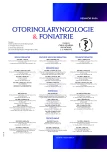-
Medical journals
- Career
Evaluation of ENT Specialty Training in Slovakia, Resident´s Perspective
Authors: L. Demešová; L. Varga
Authors‘ workplace: Klinika otorinolaryngológie a chirurgie hlavy a krku LF UK a UNB, Bratislava
Published in: Otorinolaryngol Foniatr, 68, 2019, No. 4, pp. 217-223.
Category: Original Article
Overview
Introduction: The ENT specialty training in Slovakia is provided by 4 different institutions / medical faculties. It takes 5 years to complete the postgraduate training, resident has to spend two years at the accredited department and carry out nine months of rotations.
Material and Methods: In 2018, we identified 84 young doctors in the ENT residency program in Slovakia. Electronic online questionnaire containing 27 questions was sent to all junior doctors in ENT training. The obtained anonymous responses were statistically analyzed.
Results: The questionnaire was completed by 50% of residents. More than 80% of responses were sent by female doctors. Surgical skills of Slovak ENT residents are rather limited to the basic procedures (tonsillectomy, adenotomy, grommet insertion, and tracheostomy). Only few of them are capable to independently perform surgical procedures in otology, head and neck oncology and rhinology. Despite overall satisfaction with the specialty training, more than 80% of residents suggest that the mandatory 2-year training period spent at the accredited ENT departments in university hospitals is too long.
Conclusion: We think, that regular feedback from young doctors is important for continuous improvement in our clinical specialty and postgraduate education.
Keywords:
questionnaire survey – residents – specialty training
Sources
1. Ali A., Subhi Y., Ringsted, C. et al.: Gender differences in the acquisition of surgical skills: a systematic review. Surg Endosc, 29, 2015, 11, s. 3065-3073.
2. Belini, M. I., Graham, Y., Gates, C. et al.: A woman‘s place is in theatre: women‘s perceptions and experiences of working in surgery from the Association of Surgeons of Great Britain and Ireland women in surgery working group. BMJ Open, 9, 2019, 1, e024349.
3. Chány, C. W., Mills, J. C.: Effects of a reward system on resident research productivity. JAMA Otolaryngol Head Neck Surg, 139, 2013, 12, s. 1285-1290.
4. Goodrich, J., Fitzsimons, B.: Capturing patient experience to improve healthcare services. Nurs Stand, 2018. Dostupné z URL: https://journals.rcni.com/nursing-standard/evidence-and-practice/capturing-patient-experience-to-improve-healthcare-services-ns.2018.e11177/abs.
5. Gotlieb, R., Abitbol, J., How, J. A. et al.: Gender differences in how physicians access and process information. Gynecol Oncol Rep, 27, 2019, s. 50-53.
6. Groenewegen, P. P., Hansen, J., de Jong, J. D.: Trust in times of health reform. Health Policy, 123, 2019, 3, s. 281-287.
7. Hsu, A. K., Tabaee, A., Persky, M. S.: Mentorship in otolaryngology residency: the resident perspective. Laryngoscope, 120, 2010, 6, s. 1263-1268.
8. Mansi, A., Karam, W. N., Chaaban, M. R.: Attitudes of residents and Program directors towards tesearch in otolaryngology residency. Ann Otol Rhinol Laryngol, 128, 2019, 1, s. 28-35.
9. Oates, K., Wilson, I., Hu, W. et al.: Changing medical student attitudes to patient safety: a multicentre study. BMC Med Educ, 18, 2018, 1, s. 205.
10. Oker,, N., Alotaibi N. H., Reichel, A. C. et al.: European otorhinolaryngology training programs: results of a European survey about training satisfaction, work environment and conditions in six countries. Eur Arch Otorhinolaryngol, 274, 2017, 11, s. 4017-4029.
11. Oker, N., Escabasse, V., Al-Otaibi, N. et al.: Acquisition of diagnostic and surgical skills in otorhinolaryngology: a comparison of France and Germany. Eur Arch Otorhinolaryngol, 272, 2015, 11, s. 3565-3573.
12. Oker, N., Escabasse, V., Coste, A. et al.: ORL residency in France: Satisfaction and training quality in 2013. Eur Ann Otorhinolaryngol Head Neck Dis, 132, 2015, 6, s. 327-332.
13. Raftopulos, M., Wong, E. H., Stewart, T. E. et al.: Occupational burnout among otolaryngology-head and neck surgery trainees in Australia. Otolaryngol Head Neck Surg, 160, 2019, 3, s. 472-479.
14. Smatanová, K., Yassin, G., Tedla, M.: Špecializácia v otorinolaryngológii, chirurgii hlavy a krku vo Veľkej Británii - pohľad zvnútra. Otorinolaryng a Foniat /Prague/, 63, 2014, 3, s. 198-201.
15. UEMS Training Logbook of Oto-Rhino-Laryngology - Head and Neck Surgery. 37 s. Dostupné z URL: http://www.ceorlhns.org/education/uems-orl-log-book.html.
16. Villwock, J. A., Bowe, S. N., Rotich, D. C. et al.: What makes us tick: Implications of personality differences among otolaryngology residents and faculty. Laryngoscope, 2018. V tisku.
17. Villwock, J. A., Hanilo, C. S., Ryan, J. T. et al.: The Role of the away rotation in otolaryngology residency. Otolaryngol Head Neck Surg, 156, 2017, 6, s. 1104-1107.
18. Zahtz, G., Vambutas, A., Husary, H. M. et al.: Resident research experience and career path association: A National Survey of Recent Otolaryngology Graduates, 151, 2014, 1, s. 46-51.
Labels
Audiology Paediatric ENT ENT (Otorhinolaryngology)
Article was published inOtorhinolaryngology and Phoniatrics

2019 Issue 4-
All articles in this issue
- Video Head Impulse Test, závrať, vestibulární neuronitida, vestibulární vyšetření, učební křivka
- Balloon Eustachian Tuboplasty in Treatment of Chronic Otitis Media with Effusion
- Computational Fluid Dynamics of Nasal Airflow Under Physiological Conditions - First Experience
- Distinctions of Tracheostomy in Patients with Burn Injuries in Neck Region
- Respiratory Epithelial Adenomatoid Hamartoma
- Evaluation of ENT Specialty Training in Slovakia, Resident´s Perspective
- Bilateral Peritonsillar Abscess
- Neuroendocrine Carcinoid of the Larynx – Case Reports and Literature Review
- Hormonally Active Ectopic Esthesioneuroblastoma in a Pediatric Patient
- Primary Vasculitis in Otorhinolaryngology: Review of the Literature and Case Reports
- Otorhinolaryngology and Phoniatrics
- Journal archive
- Current issue
- Online only
- About the journal
Most read in this issue- Video Head Impulse Test, závrať, vestibulární neuronitida, vestibulární vyšetření, učební křivka
- Bilateral Peritonsillar Abscess
- Primary Vasculitis in Otorhinolaryngology: Review of the Literature and Case Reports
- Balloon Eustachian Tuboplasty in Treatment of Chronic Otitis Media with Effusion
Login#ADS_BOTTOM_SCRIPTS#Forgotten passwordEnter the email address that you registered with. We will send you instructions on how to set a new password.
- Career

